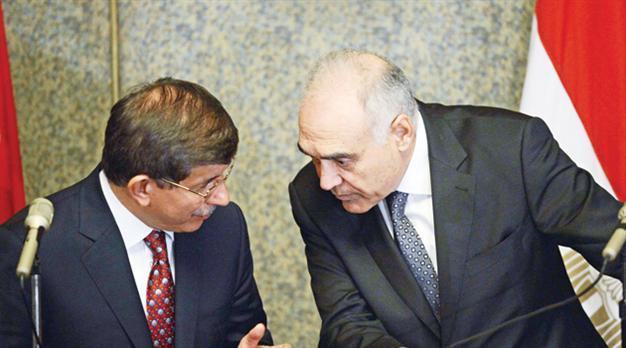Saudi absence overshadows Syria meeting
ANKARA - Hürriyet Daily News

Turkish FM Davutoğlu (L) talks with his Egyptian counterpart Amr in Cairo. AFP photo
The meeting of the regional contact group on Syria - consisting of the foreign ministers of Turkey, Iran and Egypt - was overshadowed by the absence of Saudi Arabia, with the sides agreeing to hold a second round of talks in New York in September on the sidelines of the U.N. General Assembly meetings.There are conflicting statements coming from Egypt as to why Riyadh stayed away from the meeting, which was initiated by Egyptian President Mohamed Morsi. Egyptian Foreign Minister Mohammed Kamel Amr said after the meeting that Saudi Foreign Minister Prince Saud al-Faisal “had previous commitments.” However, Egyptian presidential spokesman Yasser Ali and an Arab League official both said the Saudi minister had stayed away for health reasons.
Before the meeting, Turkish Foreign Minister Ahmet Davutoğlu stressed that Saudi participation would be crucial. “Consultations with Saudi Arabia are necessary because the kingdom is a key player in the attempt to reach a solution in the Syrian crisis,” he said. Davutoğlu also said Saudi Arabia, which attended a preparatory meeting last week, would be absent on Sept. 17, but that it would join in future meetings.
Diplomats and Western officials are skeptical that the group can reach any tangible deal, particularly as it includes regional rivals Saudi Arabia and Iran, who have vastly different approaches to the issue. Turkey, Saudi Arabia and Egypt have all demanded that Syrian President Bashar al-Assad step down, while Iran is his main ally and accuses other states of helping the rebels who are fighting to topple him.
Before meeting his counterparts, Davutoğlu met with Morsi and Prime Minister Hisham Qandil. Speaking after meeting Qandil, Davutoğlu said they both aimed to build a “new Middle East.” “Cooperating with Egypt and other states we will build a new Middle East,” the foreign minister said, adding that Ankara was ready to share its experiences with Cairo.
“These sorts of meetings are important with regard to regional countries staking a claim in regional problems,” Foreign Ministry Spokesperson Selçuk Ünal told reporters yesterday regarding the quartet meeting.
The three participating ministers of the contact group decided to gather in the U.N. General Assembly in New York again and agreed on intensifying their contacts, Ünal said. Iranian Foreign Minister Ali Akbar Salehi told his Egyptian and Turkish counterparts that “observers” from their countries, and from Saudi Arabia, could “monitor the process of stopping the violence in Syria,” according to state-run state agency IRNA.
However, a Turkish diplomat said that no such proposal was raised in the Cairo meeting. “However, I can reiterate our principle ... any effort made to end the bloodshed will be supported by us,” Ünal said. The aim of the meeting in Cairo was to lay the basis for the cooperation of the relevant countries and enable them to discuss the issue more often, he added. “We saw that that basis was established in the meeting.”
On the other hand, Ünal said Davutoğlu had held a meeting with defected Syrian Prime Minister Riyad Hijab in Istanbul two weeks ago.
Brahimi visits Hatay camp
HATAY
United Nations peace envoy for Syria Lakhdar Brahimi said he hoped for peace in Syria and an early return home for Syrian refugees, after meeting with them at a Turkish refugee camp in Hatay.
The U.N. envoy met representatives of the 1,300 Syrian refugees living at the Altınözü camp in Hatay, in his first encounter with the refugees since taking over the mission from his frustrated predecessor. “We hope that their country will find peace again and that they can return to their country as soon as possible,” Brahimi said in a meeting with local Turkish officials, according to Agence France-Presse. He said he was visiting refugee camps in Syria’s neighboring countries in order to brief the U.N. on the gravity of the situation.
The envoy said he knew the Syrian refugees were “welcome and extremely well-treated in Turkey in general,” and praised Turkish efforts to provide for the needs of the ever-growing number of refugees it has been sheltering since last year.
















